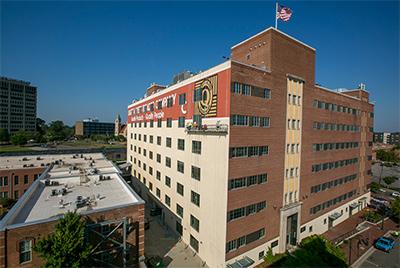
More than 1,500 researchers back in labs with more buildings to reopen shortly
Two weeks into a deliberate, rolling reopening of university labs, more than 1,500 university researchers are back at the lab bench, working under carefully developed protocols designed to protect employee health and safety.
While the process is continuing and there are still labs to reopen, the restart of laboratory research at Duke is one of the clearest signs of the university returning to core missions.
The phased reopening, under the overall direction of the Duke’s COVID-19 Task Force, acknowledges that the virus will be present for some time but that the university can move forward with essential activities by following principles based on the best scientific and health information and advice of infectious disease and public health experts.
School of Medicine research buildings began reopening on May 13, although several labs that were conducting COVID-19-related research or needed regular attention remained partially open during the pandemic, said Dr. Colin Duckett, vice dean for basic sciences in the School of Medicine. As of Tuesday, 269 School of Medicine labs are open across 25 departments with more than 1,100 researchers working in them.
“After we opened on May 13, we then took a pause, checked our assumptions and our supply chains and made some adjustments (before opening other labs),” Duckett said. “We’re now approximately one-third of the way through in terms of the number of people who will have the opportunity to return to the labs. We’re aiming to have all wet lab buildings open by approximately June 11.”
On the campus side, some 400 researchers are working in Fitzpatrick-CIEMAS, French Science, Biological Sciences, Chesterfield, Carmichael and the Levine Science Research Center, said Lawrence Carin, vice president for research.
“On June 1 we will open Hudson Hall and Gross Hall, and then the remaining buildings [Physics, TUNL and Grainger Hall] will open around June 4,” Carin said. He added that another 400 researchers will return when these buildings open.
The research will be the same, but life inside the labs looks different than before COVID-19. For one, there are fewer people at any given moment: Supervisors and others not directly involved in research are continuing to work at home, and researchers’ schedules have been balanced to keep the density of the workforce as low as possible and allow for social distancing. All 24 hours of the day are being used in the schedule.
All workers are wearing face covers and washing hands at regular intervals. These are not guidelines but rules that bring consequences if they are not followed -- violation can lead to sanctions and potential loss of building privileges.
Finally, access to research buildings is being regulated and monitored. Entry requires a Duke card and each individual is entering during a specific time window. Currently, no visitors are allowed.
This article was originally published in Duke Today